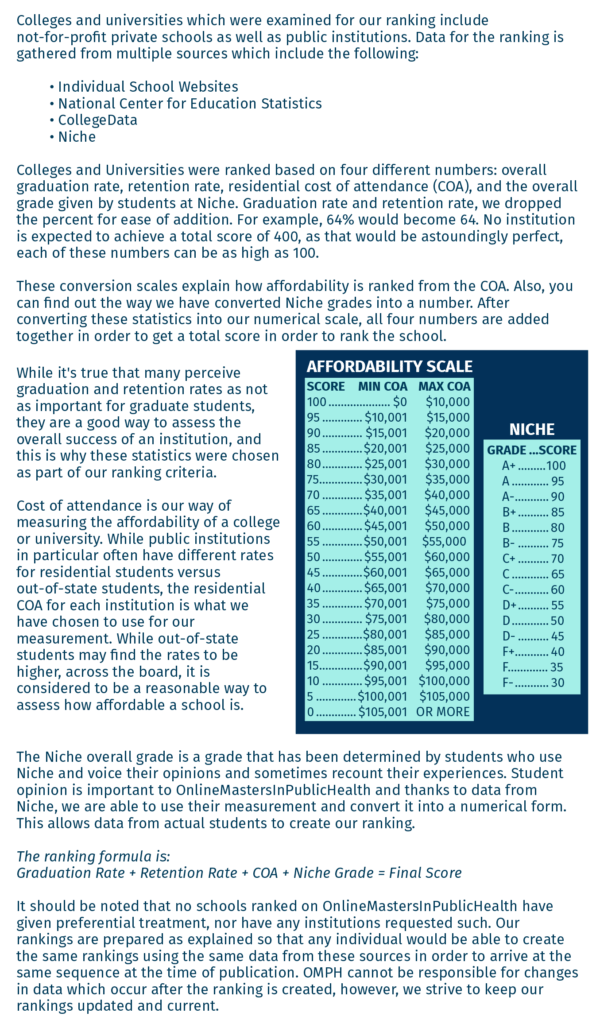Public Health Degree Programs in North Carolina
 North Carolina is the 9th most populous state in America, but also the 28th most extensive physically. It’s known for its humidity, mountainous regions, beauty, low median household income, and high poverty rate. There’s a large gap between what urban and rural North Carolinians earn and the public health problems they face. While urban areas of the state have seen steady job growth, low unemployment, and rising wages since 2000, the rural areas have faced job loss, rising levels of poverty, and population loss in the same stretch, after the loss of manufacturing jobs throughout the state, and the country.
North Carolina is the 9th most populous state in America, but also the 28th most extensive physically. It’s known for its humidity, mountainous regions, beauty, low median household income, and high poverty rate. There’s a large gap between what urban and rural North Carolinians earn and the public health problems they face. While urban areas of the state have seen steady job growth, low unemployment, and rising wages since 2000, the rural areas have faced job loss, rising levels of poverty, and population loss in the same stretch, after the loss of manufacturing jobs throughout the state, and the country.
North Carolina is known for its long tradition of public higher education. Its first public university, the University of North Carolina at Chapel Hill was founded in 1795. It now hosts one of the best public health schools in the country. The state’s economy has seen a growth in STEM-related positions and is a major producer of tobacco, textiles, sweet potatoes, pigs, hogs, trout, and turkeys.
Major health problems in North Carolina include:
- Alzheimer’s Disease
- Heart Disease
- Stroke
- Cancer
- Chronic Lung Disease
- Tobacco use
- Obesity
- Diabetes
According to U.S. News & World Report, North Carolina ranks 30th in healthcare access, 41st in healthcare quality, and 34th in public health. The state is making a concerted effort to change these rankings, and you can be a part of it
Some of the things you could work on as a public health professional in North Carolina include:
- Tobacco use prevention
- Obesity Prevention
- Adolescent Health
- Expanding Access to Care
- Violence Prevention
- Lowering infant mortality rates
On this list we’ve ranked five of the best public health degree programs in North Carolina using the following methodology:
North Carolina Public Health Degree Program Methodology
In building the ranking for The 5 Best Public Health Degree Programs in NC, we here at OnlineMastersinPublicHealth looked through all of the Public Health degree programs available in the state of North Carolina. These include programs were able to be completed online, partially online, or if the programs were on-campus as well as different types of degree within the field of Public Health. We followed a standard methodology which is explained below. In some cases, a school may be omitted due to a lack of available data at the time of research.

1: University of North Carolina at Chapel Hill
 UNC at Chapel Hill is a public research university and flagship school of the UNC system. Nearly 30,000 students attend the school, which offers a 13:1 student-to-faculty ratio. It was founded in 1789 and is one of three schools claiming to be the oldest public university in the country. UNC offers 71 bachelor’s, 107 master’s and 74 doctoral degree programs. In 2015, U.S. News & World Report ranked it 5th among the top public colleges and universities in the United States. It was ranked 30th last year. Most importantly, its public health school is ranked top 3 in the nation perennially by USNR. UNC’s Tar Heels compete in NCAA Division 1, in men’s sports like baseball, basketball, cross country, fencing, football, golf, lacrosse, soccer, swimming & diving, tennis, track & field, and wrestling. Women’s sports include basketball, cross country, fencing, field hockey, golf, gymnastics, lacrosse, rowing, soccer, softball, swimming and diving, tennis, track & field and volleyball. UNC’s illustrious, notable faculty and alumni include 9 Nobel Prize laureates, 23 Pulitzer Prize winners, 49 Rhodes Scholars, and President James K Polk. In 2017-18, graduate tuition for UNC is:
UNC at Chapel Hill is a public research university and flagship school of the UNC system. Nearly 30,000 students attend the school, which offers a 13:1 student-to-faculty ratio. It was founded in 1789 and is one of three schools claiming to be the oldest public university in the country. UNC offers 71 bachelor’s, 107 master’s and 74 doctoral degree programs. In 2015, U.S. News & World Report ranked it 5th among the top public colleges and universities in the United States. It was ranked 30th last year. Most importantly, its public health school is ranked top 3 in the nation perennially by USNR. UNC’s Tar Heels compete in NCAA Division 1, in men’s sports like baseball, basketball, cross country, fencing, football, golf, lacrosse, soccer, swimming & diving, tennis, track & field, and wrestling. Women’s sports include basketball, cross country, fencing, field hockey, golf, gymnastics, lacrosse, rowing, soccer, softball, swimming and diving, tennis, track & field and volleyball. UNC’s illustrious, notable faculty and alumni include 9 Nobel Prize laureates, 23 Pulitzer Prize winners, 49 Rhodes Scholars, and President James K Polk. In 2017-18, graduate tuition for UNC is:
- $9,943 for in-state students.
- $27,154for out-of-state students.
UNC offers many Public Health degrees. They include:
- A Bachelor of Science in Public Health that comes in specializations like Biostatistics, Environmental Health Sciences, Nutrition, Health Systems and Management.
- An MPH program in 12 different concentrations.
- An Online MPH program that can be taken on a full or part-time basis.
- Online MS programs in Biostatistics, Clinical Research, Environmental Sciences and Engineering, Environmental Engineering, and more.
- A Dual BSPH-MPH program.
- A litany of dual MPH programs that take UNC’s existing MPH concentrations and pair them with other Master’s programs (like City and Regional Planning, Business, Information Science, and much more).
- Master’s to Doctoral Public Health programs.
- Nine Doctoral Public Health programs.
- 10 certificates in Public Health.
Prospective students can check out UNC Chapel Hill’s program website for more info and details.
2: Elon University
 Elon is a private liberal arts university headquartered in Elon, North Carolina. It also has a satellite campus in Greensboro. Elon was founded in 1889. It’s known for offering quality Bachelor of Arts, Bachelor of Fine Arts, Bachelor of Science, Bachelor of Science in Business Administration, Master of Arts in Interactive Media, Master of Business Administration, Master of Science in Management, Master of Education, Master of Science in Physician Assistant Studies and Doctor of Physical Therapy degrees. Nearly 6,800 students attend Elon, which offers a 12:1 student-to-faculty ratio. U.S. News & World Report ranked Elon #1 among southern regional universities in 2017. It has also been commended for its programming, conscience, and desirability by The Daily Beast, Fiske Guide to Colleges, Princeton Review, and more. The Elon Phoenix is comprised of 17 varsity sports teams within the NCAA’s Division I Colonial Athletic Association. Sports include baseball, basketball, cross-country, football, golf, soccer, and tennis for men, and basketball, cross-country, golf, indoor track, outdoor track, soccer, softball, tennis, lacrosse, and volleyball for women. Notable alumni include actress Lisa Goldstein, Admiral William E. Gortney, Commander of NORAD and US Northern Command, and Bernadette Spong, the CFO of Orlando Health, among many others. In 2017-18 undergraduate tuition at Elon is:
Elon is a private liberal arts university headquartered in Elon, North Carolina. It also has a satellite campus in Greensboro. Elon was founded in 1889. It’s known for offering quality Bachelor of Arts, Bachelor of Fine Arts, Bachelor of Science, Bachelor of Science in Business Administration, Master of Arts in Interactive Media, Master of Business Administration, Master of Science in Management, Master of Education, Master of Science in Physician Assistant Studies and Doctor of Physical Therapy degrees. Nearly 6,800 students attend Elon, which offers a 12:1 student-to-faculty ratio. U.S. News & World Report ranked Elon #1 among southern regional universities in 2017. It has also been commended for its programming, conscience, and desirability by The Daily Beast, Fiske Guide to Colleges, Princeton Review, and more. The Elon Phoenix is comprised of 17 varsity sports teams within the NCAA’s Division I Colonial Athletic Association. Sports include baseball, basketball, cross-country, football, golf, soccer, and tennis for men, and basketball, cross-country, golf, indoor track, outdoor track, soccer, softball, tennis, lacrosse, and volleyball for women. Notable alumni include actress Lisa Goldstein, Admiral William E. Gortney, Commander of NORAD and US Northern Command, and Bernadette Spong, the CFO of Orlando Health, among many others. In 2017-18 undergraduate tuition at Elon is:
- $34,273 for all students.
Elon offers a B.A. in Public Health, and it can also be taken as a minor. Students will learn about global threats like AIDS, avian flu, obesity, diabetes, violence, injury, and much more. They’ll take an energetic, preventative approach to deal with these problems. Students will also choose to focus on “socio-cultural context of health or mathematical and biological aspects of health and illness,” and choose an elective course to further customize this program. The program prizes real-world experience. Two of its core courses, Introduction to Public Health and Research Methods in Public Health, include field-based projects. Students also gain three weeks of full-time experience in a public health organization during their winter or summer terms at Elon.
Students interested in finding out more info can visit the Elon University program website for details.
3: Appalachian State University
 Appalachian State is a public university headquartered in Boone, North Carolina. It was founded in 1899 as a teacher’s college. For 68 years, Appalachian State only conferred degrees in education, expanding its programming in 1967, then joining the University of North Carolina system in 1971. It has been cited repeatedly as a “Best Value” public school by Consumers Digest magazine, Kiplinger Personal Finance, and The Princeton Review. It has also been ranked among the top 10 Southern Master’s Universities by USNR every year since the ranking began in 1986. ASU now offers 174 undergraduate and 37 graduate majors. Its Distance Education unit is run by three off-campus centers, and its online programming (undergraduate and graduate) can be taken part-time. Over 18,800 students attend the school, which has a 16:1 student-to-faculty ratio. Notable alumni include archaeologist and author Stanley South, FEMA administrator Brock Long, actress Lisa Lynn Masters, and a litany of NFL players. Its teams are known as the Mountaineers and compete in NCAA Division 1 in 10 varsity men’s sports, and 10 women’s.
Appalachian State is a public university headquartered in Boone, North Carolina. It was founded in 1899 as a teacher’s college. For 68 years, Appalachian State only conferred degrees in education, expanding its programming in 1967, then joining the University of North Carolina system in 1971. It has been cited repeatedly as a “Best Value” public school by Consumers Digest magazine, Kiplinger Personal Finance, and The Princeton Review. It has also been ranked among the top 10 Southern Master’s Universities by USNR every year since the ranking began in 1986. ASU now offers 174 undergraduate and 37 graduate majors. Its Distance Education unit is run by three off-campus centers, and its online programming (undergraduate and graduate) can be taken part-time. Over 18,800 students attend the school, which has a 16:1 student-to-faculty ratio. Notable alumni include archaeologist and author Stanley South, FEMA administrator Brock Long, actress Lisa Lynn Masters, and a litany of NFL players. Its teams are known as the Mountaineers and compete in NCAA Division 1 in 10 varsity men’s sports, and 10 women’s.
In 2017-18, graduate tuition at ASU is:
- $4,839 for in-state students.
- $18,271 for out-of-state students.
Appalachian State offers a Bachelor of Science in Public Health. It prepares students to earn the Certified Health Education Specialist (CHES) from the National Commission for Health Education Credentialing Inc., the Physical Activity in Public Health Specialist certification from the American College of Sports Medicine and the National Physical Activity Society, and Health Coaching from a number of organizations. Students will build hard skills in community-building, environmental and systems change, and health policy advocacy. The school also offers an online Master of Science in Nutrition with a Public Health concentration. In it, students will build research skills, critical thinking skills, and gain current knowledge about food, wellness, and public health. This program can be taken in a synchronous or asynchronous format, adding to its online flexibility.
Students interested in earning a B.S. in Public Health from Appalachian State can visit their program website for more information.
4: East Carolina University
The ECU Fight Song from East Carolina University on Vimeo.

East Carolina University is a public, doctoral/research university based in Greenville, North Carolina. It’s the third largest in the state. ECU serves over 29,000 students, and a 19:1 student-to-faculty ratio. and offers many different health-related science majors. ECU’s graduate programs include 85 master’s degrees, 21 doctoral programs, and 62 certificates. It has been commended by a number of publications. In 2012, East Carolina was classified by U.S. News & World Report as a National University in its second-tier rankings. In 2010, Forbes ranked the school 36th in its America’s Best College Buys story.
In 2017-18, graduate tuition and fees at ECU are:
- $28,170 for students regardless of residence.
ECU’s Brody School of Medicine offers several graduate and doctoral public health options. They include:
- An on-campus or online Master’s in Public Health. It comes in concentrations of Epidemiology, Health Administration, and Health Behavior.
- An on-campus or online DRPH in Environmental and Occupational Health.
- An on-campus or online DRPH in Health Policy Administration and Leadership.
- An online-only certificate in Public Health Foundations & Practice.
ECU also notes that the strengths of its public health programs include:
- A practical, real-world focus.
- Research opportunities that can positively serve disadvantaged regions and communities.
- A strong public health student organization.
- Flexibility to take classes online, and outside of regular working hours.
Prospective students interested in studying Public Health at East Carolina University can visit their program website for more information and details.
5: University of North Carolina at Greensboro
 UNCG or UNC Greensboro is a public university in Greensboro, North Carolina. It was founded in 1891 and is a part of the UNC system. The school awards baccalaureate, masters, specialist, and doctoral degrees. It offers over 100 undergraduate, 61 master’s and 26 doctoral programs through schools and colleges of Arts & Sciences, Business & Economics, Education, Health and Human Sciences, Nanoscience & Nanoengineering (one of the first in the country), Nursing, Music, Theatre & Dance, Continual Learning, and more. Nearly 20,000 students attend UNC Greensboro, which offers an 18:1 student-to-faculty ratio. Notable UNCG alumni include Pulitzer Prize-winning author Claudia Emerson, North Carolina Poet Laureate Kathryn Stripling Byer, and Texas Court of Criminal Appeals Judge Barbara Hervey. UNC Greensboro’s Spartans compete in NCAA Division 1 and offer 7 varsity sports for men, and eight for women.
UNCG or UNC Greensboro is a public university in Greensboro, North Carolina. It was founded in 1891 and is a part of the UNC system. The school awards baccalaureate, masters, specialist, and doctoral degrees. It offers over 100 undergraduate, 61 master’s and 26 doctoral programs through schools and colleges of Arts & Sciences, Business & Economics, Education, Health and Human Sciences, Nanoscience & Nanoengineering (one of the first in the country), Nursing, Music, Theatre & Dance, Continual Learning, and more. Nearly 20,000 students attend UNC Greensboro, which offers an 18:1 student-to-faculty ratio. Notable UNCG alumni include Pulitzer Prize-winning author Claudia Emerson, North Carolina Poet Laureate Kathryn Stripling Byer, and Texas Court of Criminal Appeals Judge Barbara Hervey. UNC Greensboro’s Spartans compete in NCAA Division 1 and offer 7 varsity sports for men, and eight for women.
UNC Greensboro offers the following Public Health degrees:
- A Bachelor of Science of Public Health with a concentration in Community Health Education. Students will learn to design and execute, “community-based strategies to maintain healthy lifestyles and prevent a wide variety of health problems.”
- An entirely online Bachelor of Science in Public Health with a concentration in Health Studies. Students will learn to promote health equity and figure out the roots of health problems from an intersectional perspective.
- A Master of Public Health in Community Health Education. It covers epidemiology, statistics, environmental health, health policy, and features coursework and field-based experiences for practical learning.
- A Ph.D. in Community Health Education, which emphasizes “community-engaged research in public health and health education.”
Students can visit UNC Greensboro’s Public Health program website for more info or details.
North Carolina Public Health Degree Programs – In Conclusion
Before confining yourself to public health degree programs in North Carolina, take a look at some of the top MPH programs in the country. We’ve ranked them here, on our Top 25 Online MPH Programs ranking.
- 1. University of Florida
- 2. University of North Carolina at Chapel Hill
- 3. University of California, Berkeley
- 4. Purdue University
- 5. Indiana University Bloomington
- 6. University of Massachusetts Amherst
- 7. University of South Florida
- 8. University of South Carolina
- 9. George Mason University
- 10. San Diego State University
You might also want to check out our rankings on online Biostatistics MPH degree programs. We’ve also ranked the online Bachelor’s in Public Health Degree Programs, and Online Master’s Degree in Health Administration programs.